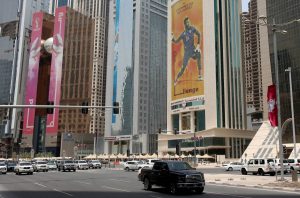Prior to the World Cup, Qatar’s capital saw the eviction of thousands of workers.

There were 1,200 people living in one building in Doha, according to locals, who were given just two hours to go.
Workers who were evicted from their houses told Reuters that Qatar has cleared out apartment buildings housing thousands of foreign workers in the same districts in the heart of the city Doha where visiting soccer fans will stay during the World Cup.
The majority of the workers were Asian and African, and they claimed that more than a dozen buildings had been evacuated and shut down by officials, forcing them to find any refuge they could, even camped out on the sidewalk outside one of their old houses.
Less than four weeks remain before the commencement of the world soccer championship on Nov. 20, which has garnered great international attention to Qatar’s treatment of foreign workers and its stringent social restrictions.
Authorities gave inhabitants in one building in Doha’s Al Mansoura neighbourhood just two hours to evacuate on Wednesday at around 8 p.m. Residents claimed that the building contained 1,200 people.
Around 10.30 p.m., local officials allegedly returned, ordered everyone out, and closed the building’s doors. Some men were unable to make it back in time to get their possessions.
One man told Reuters the following day as he prepared to spend a second night sleeping outside with about 10 other men, some of whom were shirtless in the Gulf Arab state’s autumnal heat and humidity, “We don’t have somewhere to go.”
He and the majority of other employees who spoke with Reuters declined to provide their names or other identifying information out of concern for retaliation from the government or their companies.
A mattress and a small refrigerator were being loaded into the back of a pickup truck by five men nearby. About 40 kilometres (25 miles) north of Doha, in Sumaysimah, they claimed to have discovered a room.
The evictions, according to a representative of the Qatari government, were planned “in line with continuing comprehensive and long-term plans to re-organise regions of Doha” and had nothing to do with the World Cup.
The official stated that all have subsequently been placed in safe and suitable housing and that any requests to leave “would have been performed with due notice.”
FIFA, the organisation that oversees soccer worldwide, did not respond to a request for comment, and the World Cup organisers in Qatar forwarded questions to the government.
GLEETTO-ISATION DELIBERATE
Three million people, or 85% of Qatar’s population, are foreign workers. Contrary to individuals employed by large construction companies, who reside in camps with thousands of people, many of those who were evicted work as drivers, day labourers, or have contracts with businesses but are responsible for finding their own lodging.
One employee claimed that while foreign workers with families were unaffected, single guys were the target of the evictions.
More than a dozen buildings where tenants claimed people had been evicted were seen by a Reuters reporter. The electricity was turned off in certain buildings.
The majority were in areas where the government had rented out buildings to house World Cup fans. Buildings in Al Mansoura and neighbouring neighbourhoods are included on the organisers’ website, where apartments are listed for rent between $240 and $426 per night.
According to the Qatari source, city authorities have begun enforcing a 2010 legislation that forbids “workers’ camps within family residential areas,” which includes much of central Doha. The law also provides municipal authorities with the authority to evict residents.
Some of the evicted workers expressed optimism that they would be able to locate housing among specially constructed worker’s housing in and around the industrial zone on Doha’s southwest outskirts or in distant towns, a long trip from their places of employment.
According to Vani Saraswathi, Director of Projects at Migrant-Rights.org, which advocates for migrant workers in the Middle East, the evictions “keep Qatar’s glossy and opulent image in place without publicly acknowledging the cheap labour that makes it possible.”
“Even in the best of times, this is intentional ghettoization. But evictions with little to no notice are abhorrently cruel.”
Some employees claimed to have gone through repeated evictions.
One man claimed that after being forced to switch buildings in Al Mansoura at the end of September, he and about 400 other people were abruptly relocated 11 days later. We had to get moving in a minute, he said.
Bangladeshi driver Mohammed claimed that up until the municipality gave him 48 hours to vacate the villa he rented with 38 other people on Wednesday, he had lived in the same neighbourhood for 14 years.
He claimed that as the World Cup draws near, those who created the infrastructure for Qatar to host it are being ignored.
“Who constructed the stadiums? Who built the streets? Who created every piece? Pakistanis and Bengalis. People favour us. We are all being forced outside right now.”











































